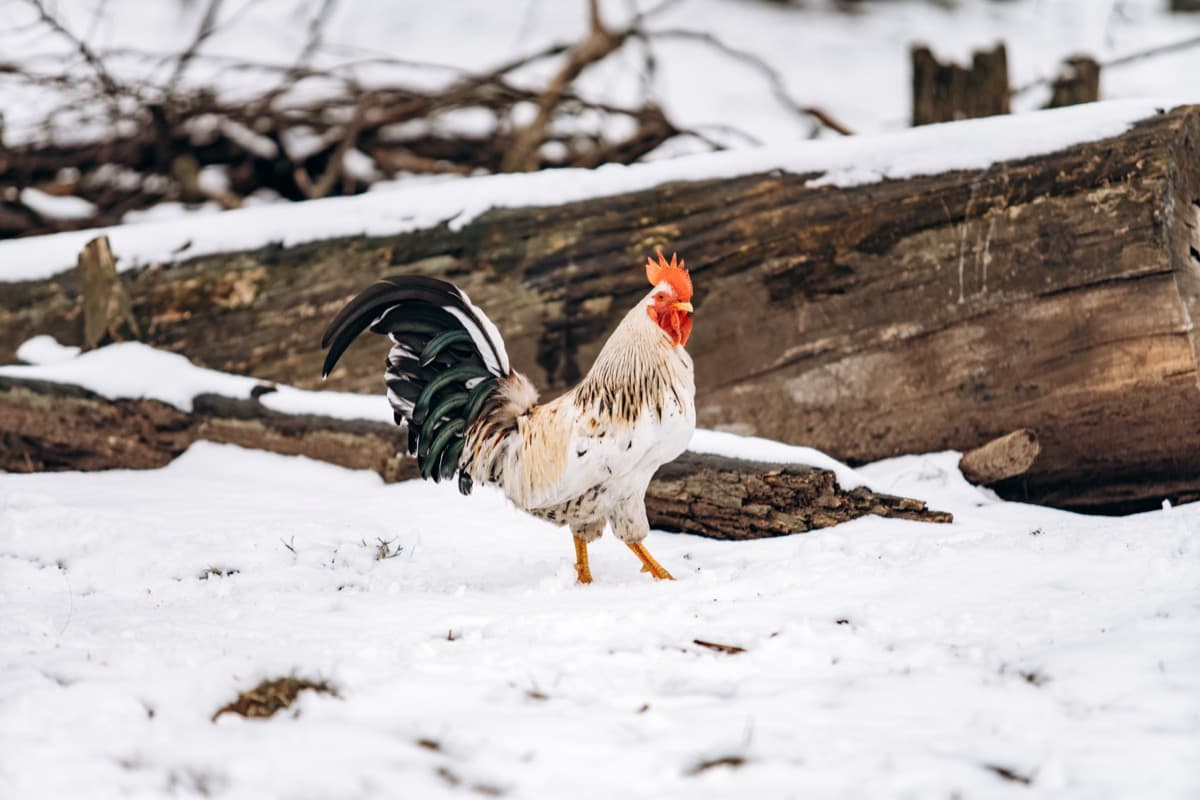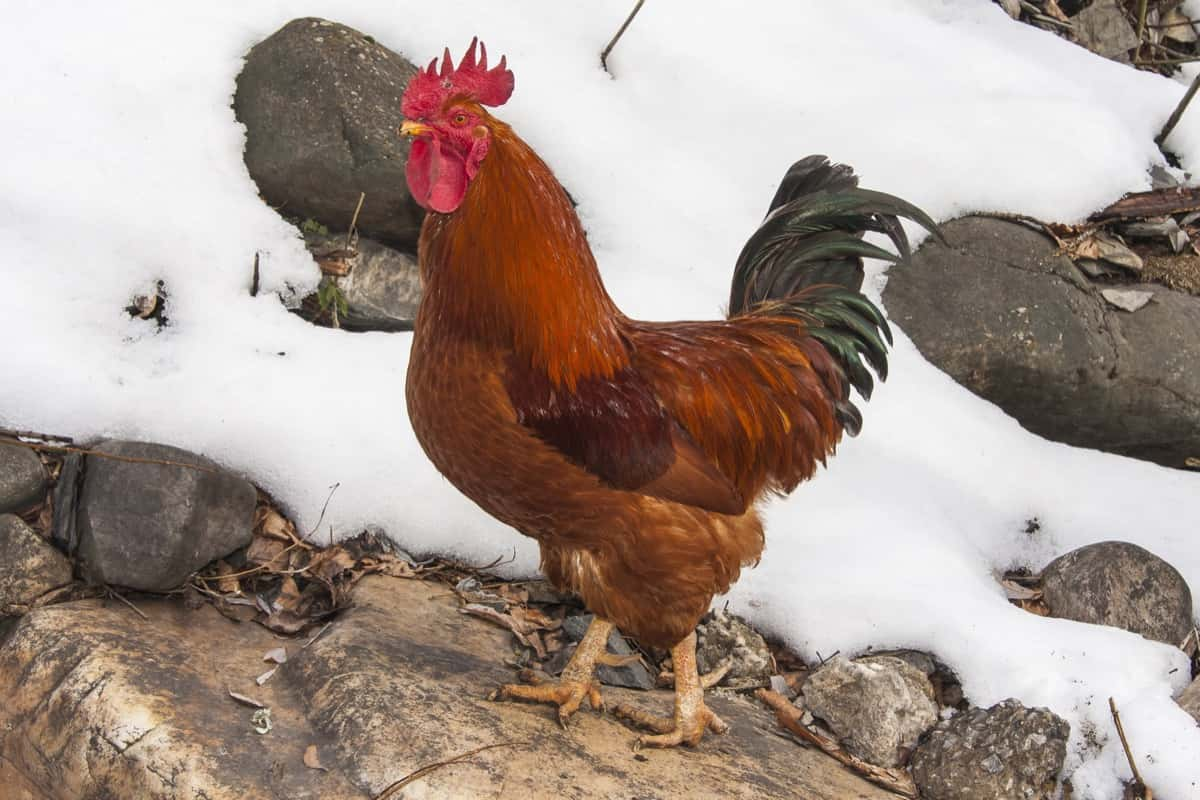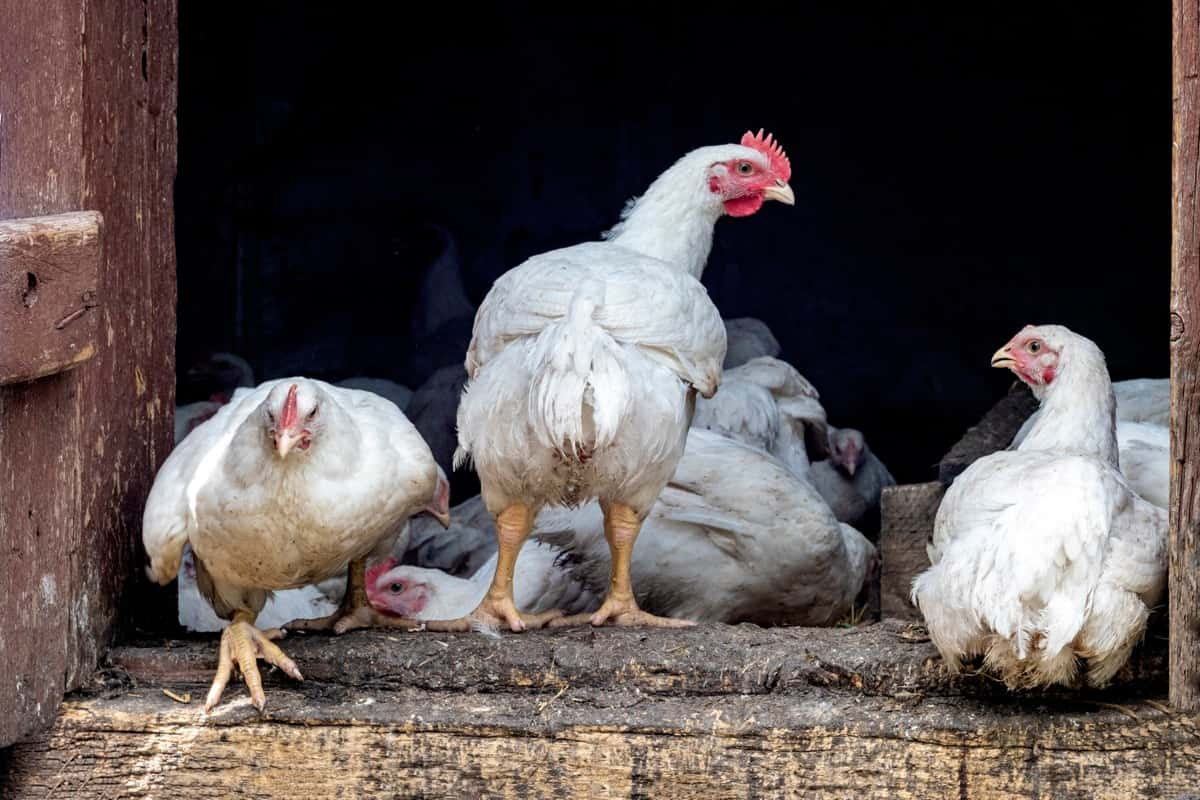Chickens are incredibly resilient creatures and can tolerate cold temperatures as long as they have proper care. However, providing them with adequate shelter, food, water, and warmth is essential during winter.

10 Mistakes to Avoid with Chickens in Winter
Not Providing Adequate Winter Shelter for Chickens
- Providing adequate winter shelter for chickens is crucial to their health and well-being. Unfortunately, one common mistake many chicken owners make is not providing enough shelter for their birds during the colder months.
- Adequate winter shelter means more than just a place to roost at night. It should protect from wind, snow, and rain while allowing ample space for movement and ventilation. Neglecting this aspect could lead to frostbite or other cold-related injuries, which can be fatal in extreme cases.
- It’s important to remember that chickens require different housing types depending on where you live.
- Neglecting adequate winter shelter for your chickens can have dire consequences on their health and survival during the colder months. Take time to ensure your flock has proper protection against the elements so they can thrive all year round.
Neglecting to Insulate the Chicken Coop in Winter
- Insulation helps regulate the coop’s temperature levels by keeping the heat in and preventing cold air from seeping through cracks and gaps.
- Not providing adequate insulation can lead to several issues for your feathered friends. They may become stressed or sick when exposed to extreme temperatures, impacting egg production and overall health.
- To avoid these problems, consider using materials such as foam board insulation or recycled denim insulation within the walls of your chicken coop. This will help trap heat inside the structure while also allowing proper ventilation.
Forgetting to Check and Replace Frozen Water Sources for Chickens
- It’s easy to forget about your chicken’s water source in winter. Their water can quickly become frozen and inaccessible with temperatures dropping below freezing. However, it is crucial to remember that chickens always need access to clean and fresh water.
- Neglecting this aspect of chicken care can lead to dehydration. So, check on your chicken’s water source multiple times a day during the colder months.
- A simple solution for keeping your chicken’s water from freezing over is investing in a heated waterer or using a heated base under their current one. This will keep the water from freezing while providing them with much-needed hydration.
Feeding Inadequate or Improper Winter Diet to Chickens
- During winter, many chicken owners do not provide an adequate and suitable diet for their feathered friends.
- For instance, some may believe feeding chickens with scraps from holiday meals is enough to keep them well-fed through the colder months. Unfortunately, this can lead to nutritional deficiencies that weaken the birds’ immune systems and make them more susceptible to illnesses.
- Plenty of fresh water and high-quality feeds rich in protein and vitamins will help ensure your chickens stay healthy even when temperatures drop outside.
- Neglecting a proper winter diet for your poultry could result in serious health problems such as weakened immune systems or malnutrition. So don’t forget about your feathered friends’ dietary needs this season.
In case you missed it: Top 10 Mistakes People Make Raising Chickens: Ultimate Guide on How to Avoid Them

Failing to Protect Chickens from Drafts and Cold Winds
Chickens are particularly vulnerable to cold temperatures because they lack insulating body fat. A common problem among some chicken owners is that as long as the coop is warm enough, they don’t need to worry about drafts or wind chill. However, even with a heated coop, if there are gaps in the walls or windows that allow cold air in, your chickens will still be exposed.
To avoid this problem, you should ensure that any openings in the chicken coop are sealed up tightly before winter arrives. Prevention is always better than cure when protecting your animals from harm.
Not Using Safe Heating Methods in the Chicken Coop During Winter
- Keeping your chickens warm during winter is essential, but safe heating methods are equally important.
- Space heaters and heat lamps can easily cause fires if they connect with flammable materials such as bedding or dry grass. If you must use a heater for warmth in the coop, then opt for ceramic bulbs that do not emit light like regular bulbs, disrupting the hens’ sleep cycle.
- It’s crucial to watch the heating equipment and ensure nothing gets too hot to touch. Also, consider placing heated pads under roosts rather than above them; this way, there is no risk of burning feathers while providing sufficient warmth.
Ignoring the Importance of Ventilation in the Chicken Coop in Winter
- Chickens produce moisture and heat, which can cause condensation to build up inside the coop if not properly ventilated. This moisture buildup creates an environment ideal for bacteria and other pathogens to thrive.
- If your chickens are exposed to stagnant air, they may suffer from respiratory issues or even death. Proper ventilation circulates fresh air throughout the coop, reducing humidity and preventing mold growth. It also helps remove ammonia fumes, which can irritate your birds’ eyes and lungs.
- One way is to provide adequate airflow in your chicken coop during winter by installing vents near the roofline of your coop that allow hot air to escape while still keeping drafts out.
- Another option is using windows with removable screens that provide natural light and ventilation when opened but keep baby chickens warm when closed. Additionally, consider adding fans or exhaust systems for larger coops or those in extremely cold climates. Keep your chickens healthy by ensuring proper fresh air circulation into their living quarters all year round.
Overlooking the Need for Extra Bedding to Keep Chickens Warm
Chickens need extra insulation during colder months, just like any other animal. Having enough bedding is crucial for keeping your flock comfortable and healthy. Without it, chickens will be more susceptible to frostbite, respiratory issues, and other illnesses caused by the cold weather.
Straw, hay, or wood shavings are great options since they provide good insulation while absorbing moisture from droppings. Regularly clean old bedding and replace it with fresh layers every few weeks. This helps prevent ammonia buildup, which can cause respiratory problems for your birds.
Delaying or Neglecting Chicken Health Checks in Winter
- As a chicken owner, it’s important to prioritize the health of your feathered friends. Neglecting their health checks during winter can have serious consequences. Regular check-ups are crucial in keeping your chickens healthy and happy.
- During winter, chickens can be more susceptible to illnesses due to cold and harsh weather conditions. Delaying or neglecting their health checks can lead to the spread of infections or diseases among your flock. This could cause severe damage to the birds and potentially affect other animals on your farm.
In case you missed it: 9 Common Problems With Hens and Chicks Plants: Solutions and Treatment

Underestimating the Risks of Predators Targeting Chickens in Winter
Many predators become more active in winter as they struggle to find food sources. One common mistake is assuming that any old coop will do when it comes to keeping predators at bay. It’s important to thoroughly inspect your coop before winter arrives and make necessary repairs. Another mistake is failing to provide adequate nighttime protection for your chickens. Predators are often most active under darkness, so leaving your flock exposed overnight can be extremely dangerous. Ensure all doors and windows on your coop are securely shut at night.
Conclusion
Chickens provide fresh eggs and meat for consumption while also serving as sources of fertilizer for gardens and lawns. Additionally, they make great pets and companions. The process of raising chickens requires daily care and attention. This includes feeding them proper diets consisting of grains, vegetables, fruits, and proteins.
- Feed Your Flock for Less: Top 10 Tips to Save on Chicken Feed
- Ultimate Guide to Ossabaw Island Hog: Breeding, Raising, Diet, and Care
- Hatching Answers: The Top 10 Reasons Your Chickens Aren’t Laying Eggs
- Eggs and Economics: Breaking Down the Cost of Raising Backyard Chickens
- Defend Your Greens: Proven Methods to Keep Iguanas Out of Your Garden
- Ultimate Guide to Cinnamon Queen Chicken: A Comprehensive Guide for Beginners
- Ultimate Guide to California Tan Chicken: Breeding, Raising, Diet, Egg-Production and Care
- Ultimate Guide to Marsh Daisy Chicken: Breeding, Raising, Diet, and Care
- 10 Types of Chicken Farming Businesses You Can Start for Profits